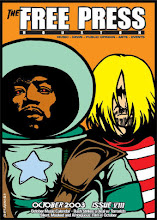Taking Woodstock

How much you like Taking Woodstock doesn't depend on how much you know about the original Woodstock. Ang Lee's film explores a turning point in a young man's life with the tumultuous festival going on as a backdrop. Leave it to Lee to envision this rite of passage with an assortment of full frontal nudity, references to peripheral events going on in the late 60s and what has to be one of the most brilliantly realized acid trips committed to film.
Through Lee's fluid direction the film flows smoothly. Sometimes he divides the screen into thirds or squares. Other times Lee recreates scenes from the documentary Woodstock, but images like the nun giving the peace sign or the portable toilet guy being interviewed not actual music performances. Taking Woodstock feels small scale yet still has bold cinematic panache. Maybe because Lee always makes heavy films (Lust, Caution, Brokeback Mountain) it's like the wanted to direct a lark. Not unlike Sam Mendes taking a breather with the more cute than profound Away We Go after the accomplished Revolutionary Road.
Taking Woodstock offers an assortment of characters, many representing the then youth culture, but I found myself caring and wanting to know more about supporting players like a dance and theatrical troupe led by an earthy Dan Fogler. Or a rather bizarre but self realized transvestite cum Korean war vet played with quiet solitude by Liev Schreiber. The VW guy and girl are charmingly channeled by Paul Dano (TWBB) and Kelli Garner (Lars and the Real Girl). Eugene Levy wins kudos as Max Yasgure who sums up the town's attitude with one of the film's defining lines: "I've heard more thank yous and hellos from these young people today than the townspeople the entire time I've lived here."
Frankly the lead character, Detetri Martin, while totally holding the film together just doesn't have the captivating trajectory of the people around him. His parents are rather a glum pair, even when they accidentally eat marijuana brownies they are boorish. Lee tries not to judge so much as observe, he just plays out the scene and lets the audience connect the dots.










